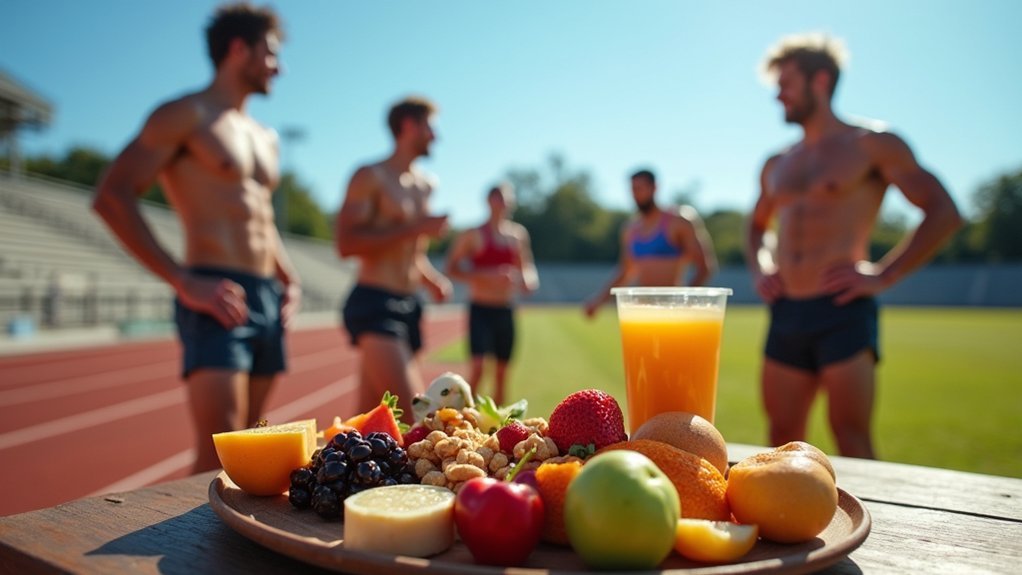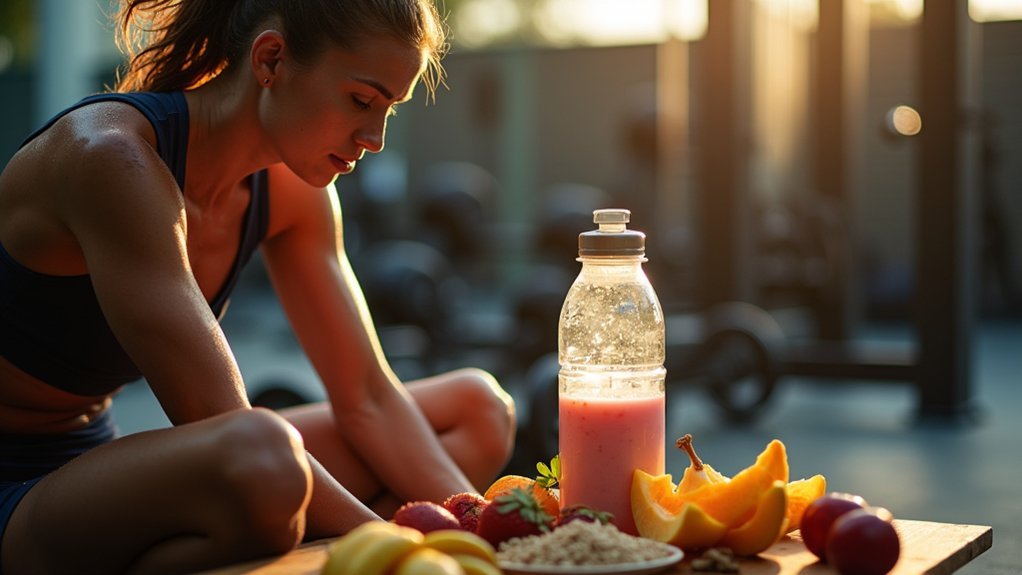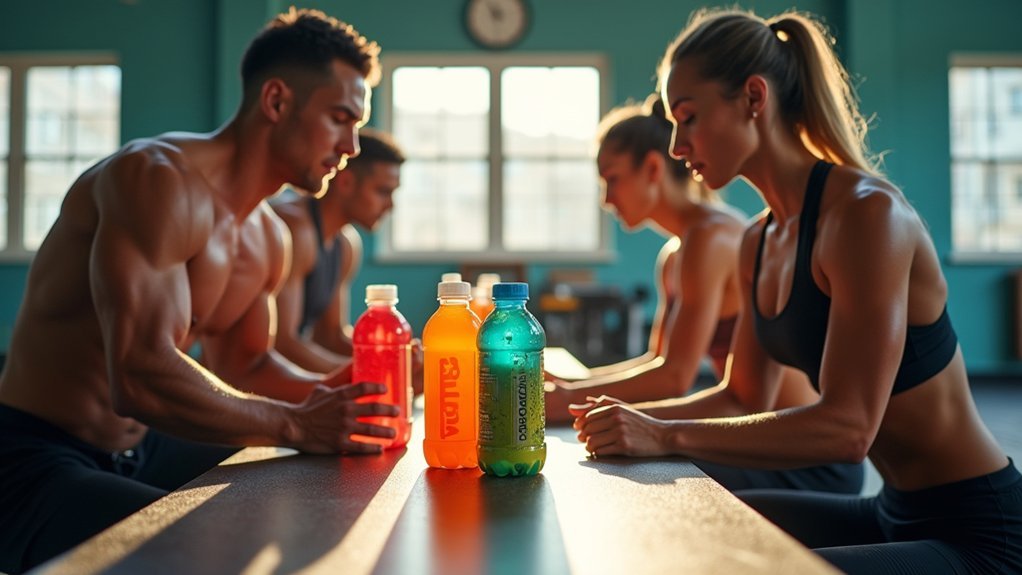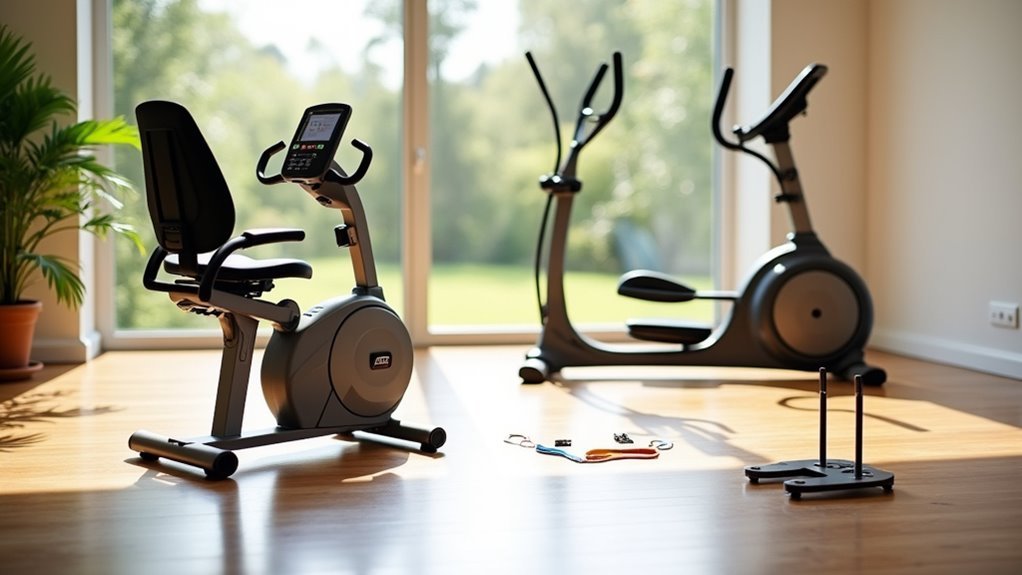Masters athletes should space protein intake (20-40g) every 3-4 hours, carb-load with 10.5g/kg of carbs 48-72 hours pre-competition, consume protein and carbs within the 30-minute to 2-hour post-exercise window, follow a 60-20-20 ratio of carbs-protein-fats before events, and use intra-workout nutrition for sessions over 60 minutes. These strategic timing approaches help combat age-related muscle loss while maximizing performance and recovery as your body faces unique physiological challenges.
5 Nutrient Timing Strategies For Masters Athletes

While aging brings natural changes to metabolism and recovery processes, optimizing nutrient timing can considerably offset these challenges for masters athletes. Your body requires strategic nutrition to counter age-related decreases in muscle protein synthesis efficiency.
Age may alter our bodies, but strategic nutrient timing can help masters athletes maintain performance and recovery despite the years.
Space your protein intake (20-40g of high-quality protein) every 3-4 hours throughout the day to maximize muscle maintenance.
Consume a balanced meal with carbohydrates (1-4g/kg) 3-4 hours before exercise, avoiding high-fat and fiber-rich foods that may cause digestive distress. Maintaining a diet of approximately 60% carbohydrates helps sustain energy levels for optimal performance. During activities exceeding 60 minutes, fuel with 30-60g carbohydrates hourly.
Post-workout, aim for 0.3-0.4g/kg of leucine-rich protein like whey to overcome anabolic resistance.
Don’t overlook evening protein consumption, which supports overnight muscle preservation when your body is repairing itself.
Maximizing Glycogen Stores: Carb-Loading for the Aging Athlete
Carb-loading serves as a powerful performance-enhancing strategy for masters athletes facing age-related challenges in energy production and storage.
As you age, your body’s efficiency in storing glycogen naturally declines, making strategic nutrition even more vital.
While younger athletes might follow standard protocols, you’ll need adjustments to accommodate your changing physiology. Aim for 10.5g/kg of carbohydrates daily during your loading phase, focusing on high-GI foods like white bread and sports drinks to rapidly replenish glycogen. Consider adopting a three-day loading process starting 72 hours before your competition to maximize glycogen storage potential.
Space your meals strategically to maintain elevated insulin levels, supporting continuous glycogen synthesis.
Remember that your recovery timeline may be extended, so begin your carb-loading 48 hours pre-event rather than the typical 24 hours, giving your body extra time to maximize stores despite age-related metabolic slowing.
The Critical Post-Exercise Window: Recovery Nutrition for Masters Athletes

As your workout ends, the physiological window for ideal recovery begins—a significant timeframe that deserves special attention for masters athletes.
This “anabolic window” spans 30 minutes to 2 hours post-exercise, when your body is primed to optimize muscle repair and glycogen restoration.
Age-related “anabolic resistance” means you’ll need more strategic nutrition timing than younger athletes.
Aim for 0.3g/kg of protein combined with high-glycemic carbohydrates immediately after training to counteract your body’s diminished protein synthesis efficiency.
Don’t overlook hydration with electrolyte-rich fluids containing sodium, potassium, and magnesium to support muscle function and prevent cramping.
While daily nutritional targets remain important, capitalizing on this recovery window becomes increasingly essential as you age, especially when training frequently or intensely.
Recent research suggests the post-workout recovery period may be more flexible than previously believed, extending up to 5-6 hours surrounding your training session.
Strategic Pre-Competition Fueling for Sustained Energy
Because a master athlete’s ability to store and access energy reserves changes with age, strategic pre-competition fueling becomes a cornerstone of performance success.
Aim for a 60-20-20 ratio of carbohydrates, protein, and healthy fats in the days leading up to competition to optimize glycogen stores.
Consume a high-carbohydrate, moderate-protein meal 3-4 hours before your event, followed by small carb-rich snacks 30-60 minutes pre-competition.
Choose easily digestible options like white bread with jam or bananas rather than high-fiber foods that might cause discomfort.
For masters athletes, consuming 1-4 grams of carbohydrates per kilogram of body weight during the pre-training window helps maintain energy levels and combat age-related fatigue.
Pair your nutrition strategy with smart hydration by drinking carbohydrate-electrolyte beverages (20 oz with 21-35g carbs) before competing.
Practice your pre-competition meal routine during training to confirm digestive tolerance and performance benefits.
Intra-Workout Nutrition: Maintaining Performance During Longer Sessions

While pre-competition fueling sets the foundation for performance, what you consume during extended workouts can make or break your results as a masters athlete.
Your aging body faces unique challenges including anabolic resistance, diminished thirst perception, and altered glycogen storage.
Age brings unique metabolic challenges—embrace targeted nutrition to overcome your body’s changing performance barriers.
For sessions exceeding 60-90 minutes, prioritize high-quality carbohydrates to maintain blood glucose and muscle glycogen. You’ll need more protein than younger athletes—consider BCAAs or EAAs during prolonged exercise to minimize muscle breakdown. As a masters athlete, you should aim for 1.2-2.0g/kg/day of protein to combat age-related sarcopenia.
Don’t wait until you’re thirsty. Schedule fluid intake every 1-2 hours with electrolyte-enriched beverages to counteract reduced kidney function and altered sweat response.
Include sodium, potassium, magnesium, and calcium to prevent cramping and maintain neuromuscular function.
Smart nutrition timing during exercise helps offset age-related physiological changes and extends your performance capacity.
Frequently Asked Questions
How Does Menopause Affect Nutrient Timing Requirements for Female Masters Athletes?
Menopause alters your metabolism, requiring you to adjust carbohydrate timing, increase protein intake around workouts, and prioritize micronutrients like calcium. You’ll need personalized strategies as hormonal changes affect energy utilization and recovery processes.
Can Intermittent Fasting Protocols Work Alongside Effective Nutrient Timing Strategies?
Yes, you can combine intermittent fasting with nutrient timing strategies by scheduling your fasting windows around workouts and ensuring you’re consuming appropriate nutrients when you do eat to support recovery and performance.
How Should Nutrient Timing Change for Masters Athletes Taking Common Medications?
You’ll need to space supplements away from medications, adjust carbohydrate timing if you’re on blood sugar medications, and possibly use smaller, more frequent meals if your medications cause digestive issues.
What Nutrient Timing Adjustments Are Needed During Injury Recovery Periods?
During injury recovery, you’ll need frequent protein-rich meals (35-40g) every 3-4 hours, increased overall calories (25-30 kcal/kg), and strategic carbohydrate timing to maintain muscle mass while your activity level is reduced.
How Does Alcohol Consumption Impact Nutrient Timing Effectiveness in Masters Athletes?
Alcohol disrupts your nutrient timing by impairing protein synthesis, depleting glycogen stores, and causing dehydration. You’ll need longer recovery periods and should prioritize hydration and nutrient intake before and after drinking to minimize these effects.
In Summary
You’ve now got the tools to fuel your athletic performance as a masters athlete. By timing your nutrients strategically—whether loading carbs pre-competition, refueling during workouts, or optimizing the recovery window—you’ll address the unique challenges of aging. Don’t overlook these approaches; they’re key to maintaining your competitive edge. Apply these five strategies consistently, and you’ll likely notice improved performance, faster recovery, and sustained energy.





Leave a Reply